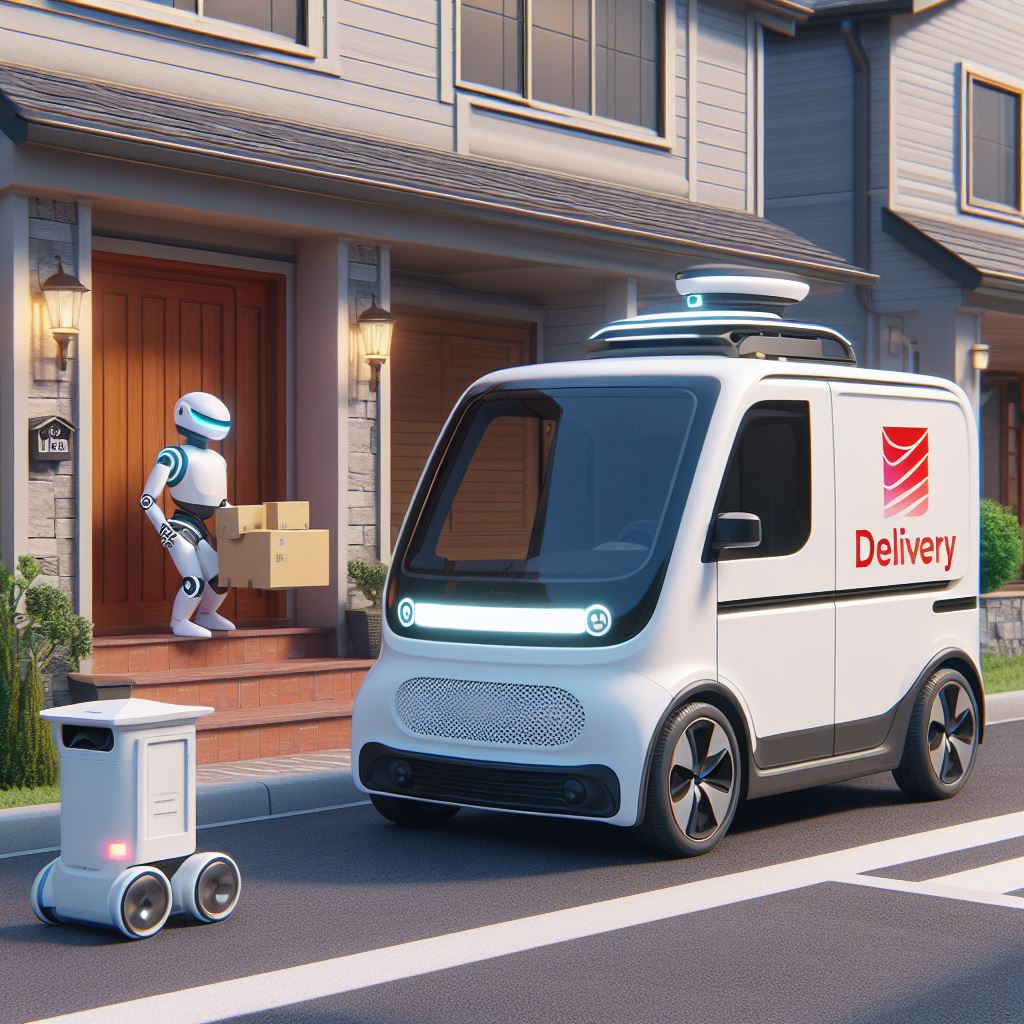How AI Can Help Logistics Companies Improve Their Last-Mile Delivery Operations
In the bustling world of logistics, last-mile delivery is often the most intricate and costly segment of the supply chain. It’s where packages make their final journey from distribution centers to the customer’s doorstep. The efficiency of this stage significantly impacts customer satisfaction and operational costs. Fortunately, advancements in AI are revolutionizing how logistics companies tackle this challenge.
In this blog, we will dive into the power of AI in optimizing last-mile delivery operations for logistics companies. From route optimization to predictive analytics, AI-driven solutions are reshaping the landscape of logistics, offering improved efficiency, cost savings, and enhanced customer experiences. Let’s explore how AI is becoming the driving force behind smoother, more effective last-mile deliveries.
Major Challenges in Last-Mile Delivery
Last-mile delivery poses several significant challenges for logistics companies due to the unique nature of the final leg of the supply chain. Understanding and addressing these challenges are crucial for optimizing operations and meeting customer expectations. Here are five major challenges:
Urban Congestion
Navigating the labyrinthine streets of urban landscapes presents a formidable challenge for logistics companies engaged in last-mile delivery. The dense population, coupled with limited parking and narrow thoroughfares, exacerbates congestion, leading to delayed delivery times and increased operational costs. Maneuvering through these congested areas demands astute route planning and real-time adjustments to ensure timely deliveries while minimizing fuel consumption and optimizing efficiency.
Delivery Time Windows
Meeting the increasingly stringent demands of customers for precise delivery time slots constitutes a paramount challenge in last-mile logistics. With modern lifestyles characterized by tight schedules, customers expect deliveries within specific time windows. Failure to meet these expectations not only results in customer dissatisfaction but also triggers logistical complications, potentially leading to costly re-deliveries and operational inefficiencies.
Parcel Theft and Security
The surge in online shopping has unfortunately paralleled an uptick in parcel theft, posing a significant challenge for last-mile delivery operations. Porch piracy and package theft not only result in direct financial losses for both customers and logistics companies but also erode trust and tarnish reputations. Implementing robust security measures and innovative technologies to safeguard parcels throughout the delivery process is imperative in mitigating this challenge and ensuring customer satisfaction.
Last-Mile Accessibility
The accessibility of delivery destinations, particularly in remote or rural areas, presents a logistical hurdle for companies engaged in last-mile delivery. Poor infrastructure, ambiguous addresses, and restricted access in gated communities or apartment complexes complicate delivery efforts, leading to delays and increased costs. Overcoming these accessibility barriers requires tailored solutions and adaptive strategies to ensure efficient and seamless delivery experiences for customers across diverse geographical settings.
Environmental Sustainability
Balancing the imperative of timely deliveries with the growing need for environmental sustainability poses a complex challenge for logistics companies. Traditional delivery methods reliant on fossil fuel-powered vehicles contribute to traffic congestion, air pollution, and carbon emissions, exacerbating environmental concerns. Embracing eco-friendly delivery solutions, such as electric vehicles and alternative transportation modes, is essential in mitigating the environmental impact of last-mile logistics and advancing towards a more sustainable future.
How AI Addresses Last-Mile Challenges
Here are some ways that AI is addressing last-mile delivery challenges for logistics companies:
Route Optimization
AI algorithms continuously analyze vast amounts of data from various sources, including historical traffic patterns, real-time road conditions, and delivery locations, to generate optimal delivery routes. These algorithms employ advanced optimization techniques such as genetic algorithms, simulated annealing, or machine learning-based approaches to iteratively refine routes based on factors like traffic congestion, weather conditions, and delivery priorities. By dynamically adjusting routes in response to changing conditions, AI-powered systems ensure that delivery vehicles take the most efficient paths to reach their destinations, minimizing travel time, fuel consumption, and environmental impact.
Furthermore, AI can incorporate additional constraints such as vehicle capacity, delivery time windows, and service level agreements to further tailor routes to specific operational requirements.
Demand Prediction
AI-driven demand forecasting models leverage advanced statistical methods, machine learning algorithms, and data mining techniques to analyze historical sales data, customer behavior, market trends, and external factors that influence demand. These models can accurately predict future demand for products or services at different time horizons, enabling logistics companies to optimize inventory management, procurement, and production planning processes. By anticipating fluctuations in demand, AI helps prevent stockouts, reduce excess inventory, and optimize supply chain operations, thereby improving resource utilization, minimizing costs, and enhancing customer satisfaction. Moreover, AI-powered demand-sensing techniques can detect changes in demand patterns in real time, allowing logistics companies to respond promptly to market dynamics and capitalize on emerging opportunities.
Vehicle Fleet Management
AI plays a crucial role in optimizing the management and operation of delivery fleets, including trucks, vans, drones, and autonomous vehicles. AI-powered vehicle tracking and monitoring systems collect data on vehicle location, speed, fuel consumption, engine performance, and maintenance history in real-time, enabling logistics companies to monitor fleet operations and identify inefficiencies or anomalies. Predictive maintenance algorithms analyze sensor data and historical maintenance records to predict equipment failures and schedule preventive maintenance tasks proactively, reducing downtime, extending asset lifespan, and minimizing maintenance costs.
AI-based routing and dispatching algorithms optimize the allocation of delivery tasks to vehicles based on factors such as vehicle capacity, proximity to delivery locations, traffic conditions, and delivery priorities, maximizing fleet utilization, minimizing delivery times, and improving service levels. Furthermore, AI enables the integration of alternative delivery methods such as drones or autonomous vehicles into existing delivery operations, offering new opportunities to enhance efficiency, speed, and flexibility.
Traffic Prediction and Avoidance
AI algorithms can analyze historical traffic data, real-time traffic feeds, and weather forecasts to predict traffic congestion and road conditions along delivery routes. By leveraging machine learning models, AI can identify patterns and trends in traffic flow and anticipate potential bottlenecks or slowdowns. With this predictive capability, logistics companies can proactively reroute vehicles to avoid congested areas, minimize delays, and optimize delivery schedules. By dynamically adjusting routes in response to changing traffic conditions, AI helps in timely deliveries and improving overall operational efficiency.
Dynamic Pricing and Cost Optimization
AI-powered pricing optimization algorithms can analyze various factors such as demand patterns, competitor pricing, inventory levels, and operational costs to dynamically adjust delivery pricing in real time. By optimizing pricing strategies based on market conditions, customer preferences, and business objectives, logistics companies can maximize revenue, improve profitability, and maintain competitiveness. Furthermore, AI-driven cost optimization techniques can identify opportunities to reduce operational expenses, such as fuel costs, labor costs, and vehicle maintenance costs, by optimizing resource allocation, scheduling, and routing decisions.
Customer Experience Enhancement
AI-driven technologies enable logistics companies to personalize the delivery experience and engage with customers more effectively throughout the delivery process. AI-powered recommendation engines analyze customer data, purchase history, preferences, and browsing behavior to provide personalized delivery options, such as preferred delivery times, locations, or delivery methods. By offering tailored delivery options that align with individual customer preferences and requirements, logistics companies can enhance customer satisfaction, loyalty, and retention.
AI-powered chatbots, virtual assistants, and conversational interfaces provide real-time updates on delivery status, answer customer inquiries, resolve issues, and provide proactive support, improving communication, transparency, and responsiveness. Furthermore, sentiment analysis algorithms can analyze customer feedback, social media interactions, and online reviews to identify trends, sentiments, and areas for improvement, enabling logistics companies to continuously enhance the quality of their services and address customer concerns proactively.
Predictive Maintenance and Asset Management
AI-enabled predictive maintenance systems can monitor the condition and performance of delivery vehicles, equipment, and infrastructure in real time using sensor data, telemetry, and historical maintenance records. By analyzing patterns and trends in equipment behavior, AI algorithms can predict potential failures or malfunctions before they occur, allowing logistics companies to schedule maintenance activities proactively, prevent unplanned downtime, and extend asset lifespan. Moreover, AI-driven asset management solutions can optimize inventory levels, warehouse layout, and storage allocation to minimize stockouts, reduce excess inventory, and improve space utilization.
Risk Management and Security Enhancement
AI-powered risk management systems can analyze various risk factors, such as weather events, natural disasters, geopolitical instability, and supply chain disruptions, to assess and mitigate potential risks to last-mile delivery operations. By leveraging predictive analytics and machine learning algorithms, AI can identify emerging risks, evaluate their potential impact, and develop proactive risk mitigation strategies. Furthermore, AI-driven security enhancement solutions, such as video surveillance, facial recognition, and anomaly detection, can enhance the security of delivery vehicles, facilities, and cargo, reducing the risk of theft, vandalism, and unauthorized access.
The Future of AI in Last Mile Delivery: A Bright, Automated Horizon
AI holds immense potential to revolutionize last-mile delivery operations for logistics companies. By tackling key challenges and optimizing processes, AI is poised to make deliveries faster, cheaper, and more customer-centric. Here’s a glimpse into the exciting future:
Enhanced Efficiency
- AI-powered route optimization: Algorithms will analyze real-time traffic, weather, and road closures to plan the most efficient routes, reducing delivery times and fuel consumption.
- Dynamic scheduling and capacity planning: AI will predict demand fluctuations and optimize driver and vehicle usage, ensuring resources are efficiently allocated.
- Automated package sorting and loading: Robots powered by AI vision and machine learning will handle sorting and loading tasks, significantly increasing speed and accuracy.
Cost Reduction
- Reduced operational costs: Optimized routes, efficient resource allocation, and automated tasks will lead to significant cost savings.
- Fuel efficiency: Shorter routes and lighter loads, thanks to AI, will translate to lower fuel consumption and reduced emissions.
- Minimized failed deliveries: Real-time tracking and proactive notifications will reduce missed deliveries, saving time and resources.
Customer Satisfaction
- Personalized delivery options: AI will analyze customer preferences to offer flexible delivery times, locations, and tracking options, boosting satisfaction.
- Predictive delivery ETAs: Customers will receive accurate and updated delivery timeframes, improving transparency and convenience.
- Enhanced communication: AI-powered chatbots will handle customer inquiries efficiently, providing 24/7 support.
Emerging Technologies
- Autonomous delivery vehicles: Self-driving cars, drones, and robots will handle deliveries in designated areas, reducing traffic congestion and labor costs.
- Predictive maintenance: AI will analyze vehicle data to predict maintenance needs, preventing breakdowns and ensuring smooth operations.
- Advanced security: AI-powered systems will leverage facial recognition, biometrics, and surveillance to ensure package security and delivery personnel safety.
Conclusion
Getting packages to your doorstep swiftly and smoothly is a big deal. Thanks to AI, companies are now able to tackle the toughest parts of this journey, especially the last mile. By using AI, they can figure out the best routes through busy cities, predict when your package will arrive, keep your stuff safe from thieves, reach even the trickiest spots, and do it all while being kinder to the environment.
With AI lending a hand, logistics companies can make deliveries faster, cheaper, and more reliable. This means happier customers and smoother operations all around. As AI technology keeps growing and improving, so do the possibilities for making the delivery process even better.
Ready to revolutionize your last-mile delivery operations with AI? Let RTS Labs be your trusted partner. Our specialized AI consulting services are designed to optimize every aspect of your logistics, from route planning to customer experience.






